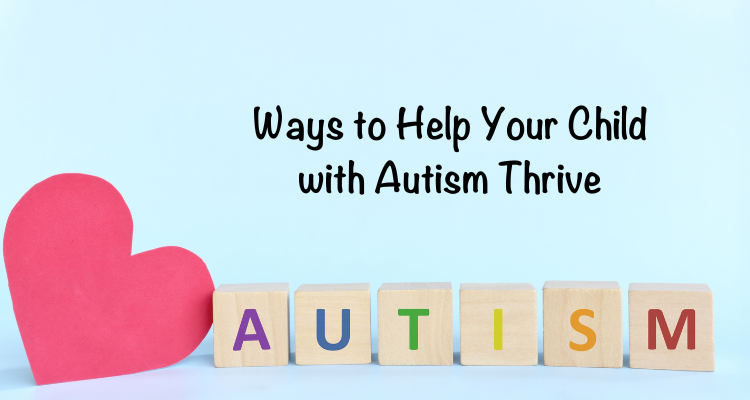Ways to Help Your Child with Autism Thrive

Ways to Help Your Child with Autism Thrive
There are tremendous advantages and unique obstacles along the path of parenting a child with autism spectrum disorder. Every person with autism has a unique way of expressing themselves socially. Also, we have ways of behaving around people and communicating with others. The growth and well-being of autistic children depend on our ability to recognize and meet their unique requirements.
Despite the challenges, there are many things parents can do to make a difference in their child’s life, allowing them not just to cope but also thrive. Parents can greatly influence their child’s life by creating a nurturing and organized environment, focusing on important skills, and utilizing their child’s abilities. The purpose of this article is to look into several ways of empowering children with autism, with an emphasis on realistic and successful techniques that can be modified to meet the requirements of specific individuals.
Creating Organized Environment
Environments that are organized and well-structured tend to be beneficial for children with autism. Their mental health depends on the stability that regularity and consistency may bring – a feeling of security and predictability.
To alleviate anxiety and promote better behavior, it is recommended to create a daily routine that includes designated times for meals, therapy sessions, school, play, and sleep. Particularly helpful for non-verbal children in understanding and following the routine are visual timetables that include images or symbols. Your kid will be better able to adjust to changes in their schedule if you give them plenty of notice and provide visual assistance.
Improving Communication Skills
Effective communication is a foundational component of success for children with autism. Given that a significant number of autistic children have challenges or delays in language development, it is crucial to prioritize the improvement of their communication skills.
If children are having difficulty communicating verbally or nonverbally, speech therapy may be a lifesaver. Picture exchange communication systems (PECS) and speech-generating devices are examples of additional aids to communication that can be helpful. Children could improve their communication skills and establish meaningful connections by encouraging social interactions in a regulated and supportive environment.
Teaching Them Toilet Training
All children reach a major developmental milestone when they learn to use the potty, but some may face additional obstacles. Implementing autism potty training strategies can ask for a more demanding and personalized approach, but they usually give better results. Positive reinforcement, frequency, and consistency are crucial.
Even more, children might benefit from visual aids such as social tales and calendars while learning how to use the toilet. Those with sensory processing disorders should also be taken into account; creating a relaxing and non-stimulating restroom space may have a significant impact. It may take longer for some children to reach this milestone, so it’s important to be patient and persistent. Your child will be motivated and their development reinforced if you celebrate their tiny victories as they go along.
Addressing Social Skills
Additionally, children on the autism spectrum often struggle in the area of social skills. Promoting engagement with others may assist them in acquiring crucial life skills and forming meaningful connections. Participation in community events, social skills groups, and organized playdates with peers may all provide chances to practice in a less frightening environment.
Also, children may benefit from social stories and role-playing to better comprehend social cues and how to act appropriately in different situations. Autistic children can learn how to engage with others more pleasantly and less scarily with regular practice and positive reinforcement.
Dealing With Challenging Behavior
Speaking of dealing with difficult behaviors and teaching new skills, behavioral interventions are crucial. When it comes to treatments for children with autism, Applied Behavior Analysis (ABA) is among the most well-known and successful options. Through a systematic and organized process, ABA aims to decrease negative or disruptive behaviors while increasing positive ones.
Also, consistent consequences, well-defined expectations, and positive reinforcement may all work together to shape behavior. If you work with a licensed therapist to create and perform a behavior intervention plan for your child, it may greatly enhance their ability to function in everyday life as well as their general health.
Promoting Independence
To help children with autism thrive, it is essential to promote independence. Teaching children self-care skills, such as clothing, eating, and personal hygiene, can empower and boost their self-esteem. A more approachable way to master these abilities is to break them down into smaller, more doable stages and to use visual aids or social tales.
Another way to encourage independence is to give them more say in the decisions they face regularly. Children may also be helped to do things on their own with the use of adapted tools and assistive technologies. Promoting a sense of independence at a young age may set the stage for future levels of autonomy and self-sufficiency.
Adapting to Their Sensory Needs
It is crucial to design a space that accommodates the sensory needs of children with autism since many of these children struggle with sensory processing. Children will feel more at ease and experience less sensory overload in environments designed with their senses in mind.
To achieve this goal, it is helpful to provide spaces where people can rest in peace, such as weighted blankets or vests, or to include sensory activities such as jumping, swinging, or tactile play. Occupational therapy plays a crucial role in developing a sensory diet that is customized to your child’s unique requirements. You can create a more peaceful and accommodating home life for your kid by learning about and adapting to his or her sensory preferences and sensitivities.
Developing a Healthy Lifestyle
All children should make an effort to be physically active and have healthy lifestyles. In addition to improving physical health, regular exercise can boost mood and alleviate stress. A great way to get your kid moving is to find something they like doing, whether that’s going for a swim, riding a bike, dancing, or just playing in the park. A healthy, well-balanced diet that takes individual tastes and dietary restrictions into account is equally important. The best way to make sure your kid gets enough nutrients for growth and development is to talk to a nutritionist or dietitian.
Closing Thoughts on Ways to Help Your Child with Autism Thrive
Achieving an ideal environment and meeting all of your child’s needs is part of a comprehensive strategy for helping your child with autism thrive. Your kid will have a better chance of realizing their potential and enjoying life to the fullest if you adapt these tactics to his or her circumstances.
Were you encouraged by what you read?
Then, would you share this article with a friend, co-worker, or family member?
Or, maybe you can send it to a friend or family member?
This blog occasionally uses affiliate links and may contain affiliate links.
Additionally, Melanie Redd is a participant in the Amazon Services LLC Associates Program.
This is an affiliate advertising program designed to provide a means for sites to earn advertising fees. These are earned by advertising and linking to amazon.com.
Also, for more on my disclosure policy, click HERE.
© Melanie Redd and Hope Ministry, 2024. Unauthorized use and/or duplication of this material without express and written permission from this blog’s author and/or owner is strictly prohibited.
Further, excerpts and links may be used, provided that full and clear credit is given to Melanie Redd and Hope Ministry.
Please give appropriate and specific directions to the original content.



0 Comments